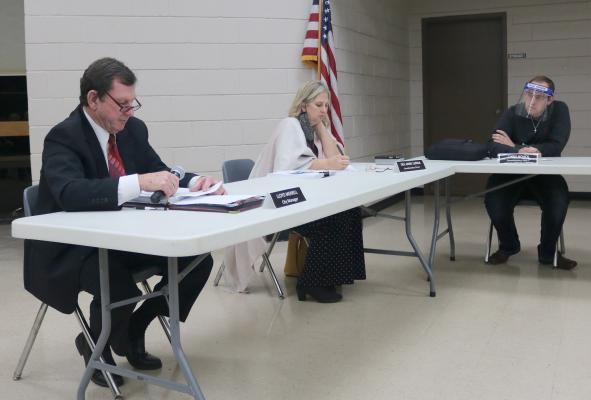Former City Manager sues City, Mayor
Merrell files lawsuit against Sealy, Bilski for unpaid compensation
An attorney for former Sealy City Manager Lloyd Merrell filed a lawsuit Thursday against the City of Sealy and Mayor Carolyn Bilski seeking $250,000 in damages after Merrell was terminated and was not compensated, according to the terms of his contract.
The petition claims that Bilski and members of the Sealy City Council wrongfully blamed Merrell for financial reversals the city experienced during the COVID-19 pandemic.
Merrell was hired as City Manager Feb. 1, 2018, and the terms of his employment were described in a City Manager Compensation Agreement executed by then-Mayor Janice Whitehead and Merrell. That one-year contract expired Jan. 31, 2019, and was extended through Jan. 31, 2021. The extension provided for a 3% increase in Merrell’s salary and a clause that provided severance pay if Merrell was terminated without cause before Jan. 31, 2021. The severance pay was equal to 16 weeks of salary.
Both under City Charter and the contract, the City Manager is responsible for the day-to-day operations of the city and serves as administrator and chief executive officer for the city. Duties include maintaining the city’s financial and operational stability as well as the appointment and removal of department heads.
Sales tax and property tax provide more than 90% of the city’s revenue each year.
The petition states that during Merrell’s tenure, Sealy experienced a surge in economic development worth about $670 million. It further claims that Merrell’s efforts to reshape policies drew private capital investment to the community.
During the first two and a half years of his employment, Merrell had virtually unanimous support from City Council, the petition states.
In October 2020, economic uncertainty related to the pandemic reached a peak for the Sealy business community. At the same time, the lawsuit claims that the newly elected mayor, Carolyn Bilski, was opposed to Merrell prior to her election and vowed to reverse course on his policies if she was elected.
Bilski was sworn in Nov. 17, 2020. At that time, the city’s general revenue fund balance had fallen to $434,000.
Merrell claims in the petition seeking damages that the low balance was due to the historic time lag between the time property taxes are billed and the time they are collected. Those ad valorem taxes make up 35% of the city’s budgeted revenue. Shortfalls in sales tax income (55-60% of budgeted revenue) also can be traced to disruptions related to the pandemic.
Bilski and various council members began pressing Merrell for a “quick fix” to the cash crisis, the lawsuit claims. Merrell advised them that the downturn had been expected, and $500,000 in expenses had been delayed to offset the revenue shortfall. Further, rising property values and new revenue from hundreds of millions of dollars in new investment were expected to begin arriving in several weeks.
To support these statements, Merrell provided council with documentation of the general fund balances during the preceding 12 months showing more than $2.2 million on hand.
Through the lawsuit, Merrell states that the mayor and council ignored these indicators of the city’s long-term fiscal health or evidence that the fund would be quickly replenished.
At the November council meeting, members questioned prior expenses – demanding to know who approved the expenses. At that time, the assistant city manager Warren Escovy claimed responsibility for the decisions, not Merrell. He also notes that the questioned items were minimal amounts and were not related to the shortfall.
A special meeting was then called for Nov. 30, 2020, ostensibly to consider methods of conducting a performance evaluation on the City Manager. By then, the petition claims that the defendants were using the uninvestigated claim that Merrell’s decisions caused the shortfall as a pretext to terminate him.
As the council prepared to go into executive session, Merrell asked to read a prepared statement into the record. In that statement, he expressed concerns about contacts between council members and employees and/or department heads that included changes to policy or new directives – without the city manager’s knowledge. Further, Merrell addressed reported meetings between elected officials and developers without any communication with the city manager.
Such contacts were not only ill-advised as a practical matter but likely violated Texas law on open meetings and transparency.
As part of his remarks, Merrell suggested that if the council no longer intended to honor Merrell’s employment contract, then they should terminate him.
“If you are not content to let me do my job, then terminate me,” Merrell said, according to pleadings. The quote is accompanied by a reference to an article about the meeting published in the Dec. 3, 2020 edition of The Sealy News. It also notes that the video recording of the meeting is strangely absent from the city’s website.
At the next meeting, the lawsuit notes that one of the council members proposed budget amendments she wanted to be placed on an upcoming agenda. Merrell said there had been no discussion with his office about the possible impact on the viability of city departments.
At the Dec. 14, 2020 meeting, Merrell tendered his resignation. He was called into the room with elected officials and informed that his resignation would be accepted effective Feb. 1, 2021. The council also agreed to pay his remaining salary as well as unused vacation and sick time through Jan. 31, 2021.
Merrell was handed a separation agreement and general release and directed to sign it. After Merrell indicated he needed time to read and review the document, he was given seven days to sign or the terms would be rescinded.
The release and the claim that the amount of pending compensation would be altered if he didn’t sign the release within seven days caused confusion, the petition says. The employment contract specifically stated the city was not obligated to pay severance pay if Merrell resigned, but that he would receive payment for unused vacation and sick leave.
The lawsuit petition states that city officials then used Merrell’s refusal to sign the separation agreement as justification to accelerate his termination and deny payment of the compensation set out in Merrell’s contract.
Defendants then demanded the cell phone, office key and credit card issued to him by the city. Police escorted him to his office at 8 p.m. and ordered him to remove his personal belongings from city hall.
Damages sought by Merrell include $100,000 in exemplary damages, unpaid severance pay, unpaid vacation and sick time accumulated during Merrell’s employment but not used, and court costs.




